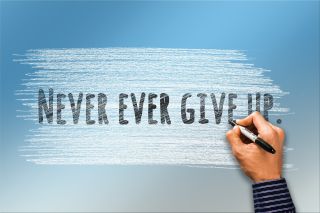Resilience
The Power of Never Giving Up
Forging a good life from the ashes of the past.
Posted June 7, 2024 Reviewed by Ray Parker

Winston Churchill, known for his powerful speeches and writings, once said, "Never, never, in nothing, great or small, large or petty, never give in except to convictions of honor and good sense. Never yield to force, never yield to the apparently overwhelming might of the enemy." This quote, delivered during a challenging time in history, became a symbol of resilience and determination. But how does it relate to finding happiness and peace in our own lives?
The Weight of the Past
In my 30 years of experience helping people improve their lives, I've found that one of the biggest obstacles to happiness is the burden of the past. Past events, whether things we've done or things that have been done to us, can hold us back from living a fulfilling life. We all have failures, regrets, and painful experiences. We may have gone through divorces, job losses, relationship struggles, or faced mental health challenges. These experiences can leave us feeling ashamed and wanting to give up. We might even resort to unhealthy coping mechanisms to numb the pain.
Choosing Resilience
But the truth is, our past does not define our future. It may influence us, but it doesn't dictate our path. We have the power to shape our lives through the choices we make. Churchill's words remind us that even when facing overwhelming adversity, we can choose resilience, perseverance, and unwavering resolve. We can choose to learn from our past, forgive ourselves and others, and move forward with courage and hope.
A New Day, A New Beginning
No matter what our past holds, today is a new day, and we can focus on making it a good one. You might be thinking, "Dr. Puff, you don't know what I've done. I've made terrible mistakes and experienced devastating failures." I understand. Many of us have. It's part of being human.
The Power of Perseverance
The difference between those who find happiness and those who don't is perseverance. We all face challenges and hardships, some more than others. But the key to happiness is never to give up, no matter what we face.
Jarvis Jay Masters: A Story of Hope
Let me tell you about a man named Jarvis Jay Masters. He's currently incarcerated in San Quentin State Prison on charges of murder, having been sent there in 1981 for armed robbery. In such a situation, many of us might give up. But Masters didn't. He realized his life was more than his past, and he chose to change. He delved into mindfulness and found a path to inner peace and transformation, even in the most challenging circumstances.
Masters studied meditation, wrote books, and even taught others. Despite being 62 years old and having spent most of his adult life in prison, he hasn't given up. He's made a significant impact on his own life, the lives of others in prison, and people around the world.
Steps to a Good Life
So, how do we start working towards a good life? Here are the steps:
- Acknowledge Our Past: We need to be truthful about our past mistakes. This isn't about dwelling on them but acknowledging them so we can move forward.
- Learn and Grow: We need to look at our past as a teacher, asking ourselves what we can learn from our mistakes and how we can grow from them.
- Forgive Ourselves and Others: Holding onto shame, regret, or resentment only keeps us stuck. Forgiveness is key to moving forward.
-
Seek Help: We don't have to go through this alone. Seeking help from loved ones or professionals can be invaluable in our journey toward healing and growth.
- Focus on the Present: We need to see each day as a new opportunity to make our lives better.
The Journey to Self-Forgiveness
Self-forgiveness is a crucial step in creating a good life. If we don't forgive ourselves, we remain trapped in a cycle of shame and regret. Here's how to achieve self-forgiveness:
- See Your Past as a Teacher: Ask yourself what you can learn from your mistakes and how you can grow from them.
- Forgive Yourself and Others: Let go of shame, regret, and resentment.
- Seek Help: Share your story with someone who loves you unconditionally and can offer support without judgment.
Resilience and Action-Oriented Hope
Building a good life is not easy. It takes time, effort, and resilience. We will face setbacks, but we must normalize them as part of the growth process. We need to cultivate a resilient mindset and find inspiration in the stories of others who have overcome challenges.
Hope is essential. It fuels us to pursue our goals and become happy individuals. We must foster a hopeful mindset and cultivate tools that nurture hope even in the darkest times. Gratitude, focusing on small victories, expressing appreciation, and recognizing each day as a fresh start are all powerful tools.
Conclusion
Creating a good life requires hope, forgiveness, action, and resilience. No matter what we've done or what has been done to us, we can choose to start today as a new day and commit to making our lives better. By taking each day as a fresh start, acknowledging our past, learning from our mistakes, forgiving ourselves and others, and cultivating resilience, we can create a fulfilling life that we can be proud of.
Remember, as Churchill said, "Never give in. Never give in. Never, never, never."




